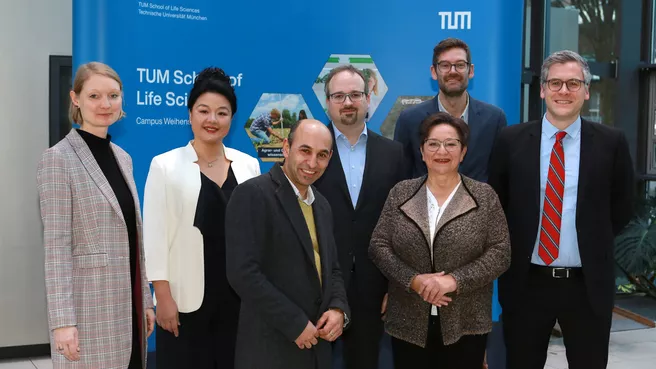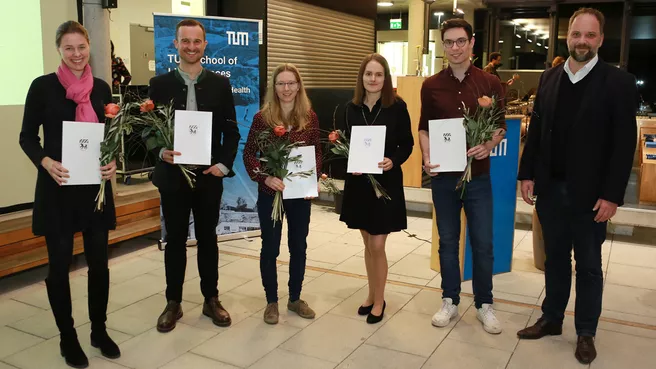"The TUM School of Life Sciences has undergone a fundamental structural reform," Prof. Kögel-Knabner emphasized right at the beginning of her welcoming address. After twenty years at the Weihenstephan Science Center, the TUM School of Life Sciences was launched in 2020 as the first of what will be seven schools. Instead of individual faculties, there are now three research departments - 41 professorships are in the field of biomolecular fundamentals, 34 professorships research systems in forestry and agriculture, and another 16 professorships combine engineering sciences with biological systems.
Top rankings and awards for faculty
"With this concentration on research areas, the School of Life Sciences can hold its own very well in national as well as international comparisons with other universities," Dean Kögel-Knabner was pleased to say. Especially in the field of agricultural and forest sciences, the School consistently ranks among the top universities internationally. This is also reflected in the numerous prizes awarded to scientists at the School of Life Sciences last year. These include, for example, the 10,000 euro Science Prize of the City of Freising for Prof. Henriette Uhlenhaut, the Max Schönleutner Medal for Prof. Kurt-Jürgen Hülsbergen and the Heinz Maier-Leibnitz Prize for Prof. Julijana Gjorgjieva.
Sustainable Campus
The topic of sustainability has already played an important role in university research for many years - in view of the climate crisis, the TUM School of Life Sciences has now also stepped up its efforts to achieve greater sustainability on campus. Students and faculty have jointly initiated the TUM Green Office Weihenstephan - staff and students network, collect ideas and jointly launch concrete projects for more sustainability on campus, for example at clothing, book or plant swaps.
Center for Integrated Infection Prevention
Human, animal and ecosystem health is at the heart of the School of Life Sciences' research interests, so it is fitting that the new building of the Center for Integrated Infection Prevention is expected to begin in summer 2023. In this center, the University of Technology will combine its expertise to develop innovative strategies to prevent, control and prevent the spread of resistant pathogens in humans and livestock.
By looking at resistant bacteria both in humans and in farm animals, the use of antibiotics in animal husbandry is to be largely avoided, existing infections are to be better controlled, and transmission paths between animals and humans are to be prevented. "We have brought several professors to our university specifically for this research area, who conduct research in these areas," Kögel-Knabner affirmed.
Newly appointed professors
In the coming years, a number of professors will be leaving. "There will be an upheaval there," Kögel-Knabner announced. The new appointees will rejuvenate the professorial staff and "it will enable us to plan strategically what research priorities we want to set in the future," the dean emphasized. Already in 2022, a total of ten new professors could be recruited for the School. Prof. Liebl, Vice Dean of the School, asked the newly appointed professors to take the stage for a brief introduction at the New Year's reception.
New to the professoriate are: Prof. Stephen Schrettl (Functional Materials for Food Packaging), Prof. Julijana Gjorgjieva (Computational Neuroscience), Prof. Mohsen Zare (Soil Biophysics and Environmental Systems), Prof. Marius Henkel (Cellular Agriculture), Prof. Li Deng (Prevention of Microbial Infectious Diseases), Friederike Ebner (Professorship of Infection Pathogenesis), Prof. Petra Först (Food Process Engineering), Prof. Julia Steinhoff-Wagner (Animal Nutrition and Metabolism) and the second members Prof. Karsten Köhler (Professorship of Physical Activity, Nutrition and Health) and Prof. Ferdinand Ludwig (Green Technologies in Landscape Architecture).
Prof. Michael Schemann (Chair of Human Biology), Prof. Wilhelm Windisch (Chair of Animal Nutrition) and Prof. Angelika Schnieke (Chair of Farm Animal Biotechnology) retired after many years of service at the University. Professor Schnieke made an important contribution to the further development of the University in Freising as Dean from 2013 to 2016 and will continue to make a valuable contribution to TUM as TUM Emerita of Excellence.
Prize for the best master's theses
Freising's mayor Tobias Eschenbacher was pleased that the event could once again be held in presence as usual. "Despite all the technical possibilities - the personal exchange was simply missing," he said in his welcoming speech.
However, the "good and close cooperation between the city and the university" had worked well in recent years, even despite Corona-related restrictions. "We are happy to have such a top university on our doorstep - and its doors are regularly wide open," Eschenbacher emphasized. In this context, he referred to events such as the Innovation Day on Nutrition or the TUM@Freising lecture series, where the people of Freising are regularly invited to interact directly with researchers at the university. "We want to dovetail life and research in Freising even better, and Weihenstephan is an ideal place for this," Eschenbacher emphasized. This year, he again awarded the prizes for the best final theses written by students from the six departments. One master's thesis per field of study was selected. All theses were awarded the dream grade of 1.0 and received prize money of 250 euros from the city of Freising.
The winners in the 2021/2022 academic year are Teresa Mittermair (Biosciences), Vera Baron (Landscape Architecture and Landscape Planning), Markus Stimmelmayer (Forestry and Resource Management), Lukas Hans (Brewing and Food Technology), Teresa Hoiß (Agricultural and Horticultural Sciences) and Alexander Wolf (Nutritional Sciences and Food Chemistry).
Editing:
Susanne Neumann
TUM School of Life Sciences
Press and Public Relations

